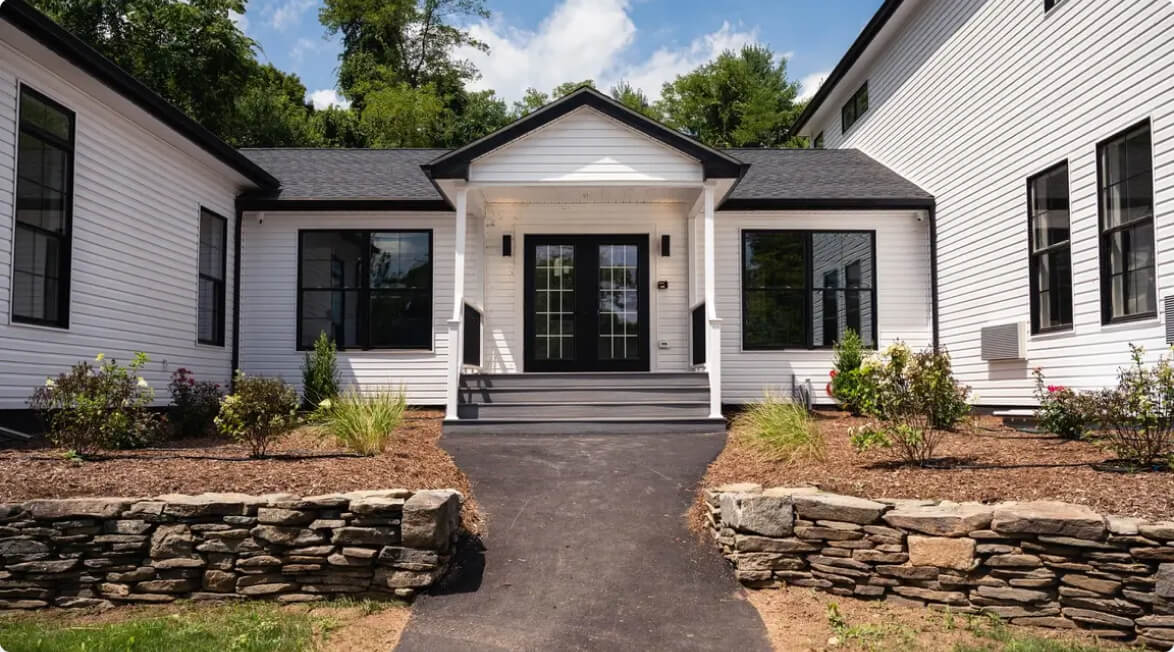LEVELS OF CARE
Addiction Aftercare Program for Substance Abuse
Addiction doesn’t have a “cure,” but it can be managed and treated effectively with therapy and counseling. Recovery is an ongoing process that continues long after your addiction treatment program ends, however.
Following more intensive therapies, aftercare focuses on the transition into day-to-day living and anticipating the future challenges to abstinence to support long-lasting recovery.
What Is Aftercare Treatment?
Aftercare is a plan to support someone in their early recovery from drug or alcohol addiction, prevent relapse, and help with the challenges of sober living.[1] This may include interventions and resources to manage triggers, stress, and challenges once treatment is over.
Every aftercare program for substance abuse is different and tailored to the needs of the individual but may include:
- Staying in a sober living environment
- Attending 12-step meetings or support groups
- Participating in an alumni program from a treatment facility
- Working with a sponsor or a sober support system
- Attending individual and group counseling
How Aftercare Works
Aftercare can take many forms, but they’re all focused on support and accountability to increase the chances of success with a treatment program. Sometimes, more than one aftercare program may be used concurrently.
The types of aftercare programs may include:

Sober Living Homes
Transitioning from rehab to regular life is an extremely vulnerable time. Sober living homes – also known as halfway houses – provide a secure, stable environment where people can come together and continue to practice their coping skills in a supportive environment free of drugs or alcohol.[4]
Sober living homes often have strict rules, including mandatory house meetings, compulsory drug screenings, participation in household chores, and most importantly, no substance use. These rules provide structure and accountability to teach people to maintain their sobriety and develop a routine for regular life.

Alumni Programs
Many comprehensive rehab programs offer alumni programs for the people who have successfully completed their treatment program. These organizations forge connections between alumni and nurture the bonds developed in rehab.

Support Groups
Most communities offer mutual support recovery groups to help people in recovery meet and share their experiences. Some examples of these groups include 12-step groups and groups like Alcoholics Anonymous, Narcotics Anonymous, Dual Recovery Anonymous, and Overeaters Anonymous.
Many of these programs are faith based, but secular programs like Smart Recovery are also available. Some community mental health centers also offer unique groups and classes for support.

Outpatient Recovery
Outpatient programs offer scheduled services like counseling, group support, and medication management for people living and working in the community. This can be a flexible option for people following inpatient or intensive outpatient treatment.
Aftercare Planning for Substance Abuse
When you enter an addiction treatment program, you will complete an assessment that allows your care team of therapists, counselors, and other healthcare professionals to determine the appropriate level of care and treatment options. Typically, this includes a plan for the full continuum of care, including the aftercare plan.
When your treatment period comes to an end, you will meet with your care team again to set up your aftercare plan. Your team will consider your circumstances and what challenges you may face in your regular life, including finding housing, gaining employment, or continuing with specific therapies and counseling sessions.
The length of your aftercare plan will depend on your needs. Some people attend aftercare for a few weeks or months after leaving treatment, while others may be in aftercare for a year or more. Generally, you should stay engaged with your aftercare program for at least one year. Some people require support groups or other elements of aftercare indefinitely.

What’s the Best Way to Find Aftercare Treatment?
An aftercare program for substance abuse is often the final stage in the continuum of care. If you attend a formal treatment program with a comprehensive care plan, your treatment team can help you transition into an aftercare program. The Substance Abuse and Mental Health Services Administration (SAMHSA) offers resources for drug and alcohol addiction treatment as well.
If you’re ready to get started now, contact Paramount Wellness Retreat to learn more about our treatment options for substance use disorder and determine next steps.

Cost of Aftercare Treatment
The cost of aftercare can vary widely. Community support groups are often free, but sober living homes or aftercare in a facility often require fees or “rent” that can differ according to the amenities, location, and therapies. Insurance may cover some aspects of aftercare as well.
Benefits of Aftercare to Prevent Relapse
Aftercare is a key part of healing from addiction and building a strong foundation for the future. Here are some benefits of addiction aftercare programs:

Continued Support and Guidance
Addiction aftercare focuses on addiction as a chronic disease that can’t be “cured” but managed. In fact, it’s a lifelong process that takes effort and dedication. While the initial need for intense treatment and support subsides eventually, most people struggling with addiction need to put effort into managing the condition indefinitely – especially in the first few months after treatment.
Aftercare includes support groups and provides continued access to therapy to help people develop the skills they need to stay sober with the stresses of day-to-day life.
Reduced Relapse Risk
The goal of addiction treatment is sobriety. Relapse is often the biggest risk for people when they finish a treatment program, which can restart the cycle of addiction.[2] Worse yet, relapsing after being sober can increase the risk of experiencing an overdose.
Aftercare reduces the risk of relapse by working on relapse prevention skills, offering support, and encouraging accountability.
Stress Management and Coping Skills
Daily life comes with stress. For someone in recovery, the stress and challenges of day-to-day life can encourage relapse, especially if someone gets involved with the people, places, and things that were once tied to addiction.
Aftercare focuses on the skills necessary to maintain sobriety while balancing the responsibilities of regular life. Therapy and support groups help with building and refining coping skills and stress-management techniques to overcome challenges and avoid temptation.
Aftercare Treatment Process
Addiction treatment often involves “steps down” in intensity and involvement as the person learns to manage their addiction. However, the shift from inpatient or outpatient care to daily life can be abrupt. The risk of relapse is highest in the first few months out of a rehab facility.[3]
Aftercare is designed to help with this transition out of treatment to manage triggers, reduce the risk of relapse, and learn to adjust to the ongoing challenges of addiction. This often involves a support system or sponsor, but once you’re stable with your sobriety, you can assume the role of a sponsor yourself to help others.